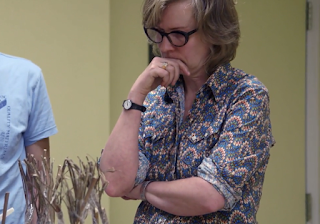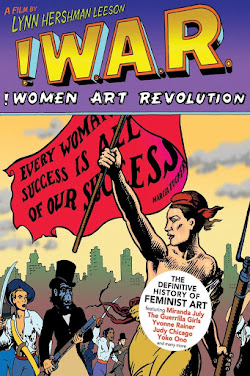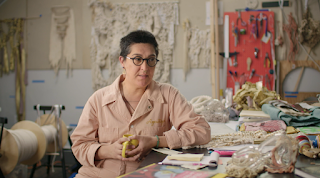Art21: "Fiction" (S7, E4)
To begin with, upon looking at the library of Art21 episodes, this particular one stood out to me the most. Once I saw the picture of a multicolored sculpture, created by one of the featured artists in this episode, my mind instantly wanted to tune in. Sure enough, I was in for a delightful treat. In this episode of Art21, the focus was upon the idea of "fiction," showcasing the three artists Katarina Grosse, Joan Jonas, and Omer Fast.
Katarina
Grosse is a German artist, specializing in large-scale sculptures. She is also
interested into bringing painting within our three-dimensional world. Her work
seems to like to play around with color and the notion of space and depth.
Thus, her goal is to bring the audience into her work. For her sculptures, she
has the help from a group of people, including her brother who works as an
engineer. My favorite of her works is
her Wunderblock from 2013, which is
also the work that is the episode's icon. It looks abstract, and the colors
(which don't follow a particular palette) work well together. It felt energized
and free, in the sense that the work seems to convey a sort of vigorous energy.
I especially love how a part of the sculpture is outside the museums wall. It
felt as though the artist is going against the boundaries of the
"inside" to allow for "outside" thought. In fact, she also
states "we are able to think big, and at the same time we're actually
quite small in relationship to what's around us." Thus, she also conveys a
feeling we may understand of something that is "beyond" our
imagination, expressing the relationship between the large, foreboding world
and our "small" place within it.
Joan Jonas
is a performance artist that, like Katarina, involves space relationships. In
fact, she was a part of the Performance art movement during the 1960s. Her
shows combined dance, theater, and cultural influences that came from her
travels. I didn't understand her intentions with her work, as what Art21 expressed made me confused. But,
with some research, I found that Joan's fantasy world is very complex and
multifaceted. Thus, my feelings of confusion were intentional, conveying that
the “self” is nonsensical. One performance series I found the most interesting
was her Reanimation series. The
series focuses on the melting of the polar ice caps, balancing the beauty of
nature and the anxiety brought upon from global warming. For her performances,
she projected a video, while she drew and her friend played the piano. The
piano music was beautiful, and I appreciated that the music was created for the
show. The message of the series also seemed clear enough for me to grasp it,
without further research.
At first, I found Omer Fast's work very confusing. He is a video artist from Berlin who wants to discuss the idea of “identity.” In his words, "what is that thing that we call identity about?" He contextualizes the idea of identity, while not making it a political statement. Upon further research, he strives to convey a relationship between reality and fiction. He admires the idea of the “narrative,” and how it can alter depending on various perspectives. His film 5,000 Feet is the Best (2011) is about a drone operator and his actions, both on and off-record. The film switches between drone footage and a meeting the operator has with a reporter in a motel room. The film was praised for how Omer Fast balanced between not praising or berating the pilot’s actions. What I found fascinating with Omer was his idea of identity not having a concrete definition. Identity is a multi-faceted conception. It's created through a person’s actions, beliefs or other people’s view upon them. As such, identity has no set answer. Identity has layers, which Omer Fast explores through his various film projects.
Information Sources:
www.jamescohan.com/artists/omer-fast?view=slider#9
www.theartstory.org/artist/jonas-joan/
*This episode was 54 minutes and 23 seconds long.*








Well done, Heather!
ReplyDeleteAfter reading your post about Joan Jonas, I find it interesting that her work might supposed to be confusing for the viewer of her performance art. I agree that her art is very hard to understand and maybe that is the point. Great work, Heather!
ReplyDelete